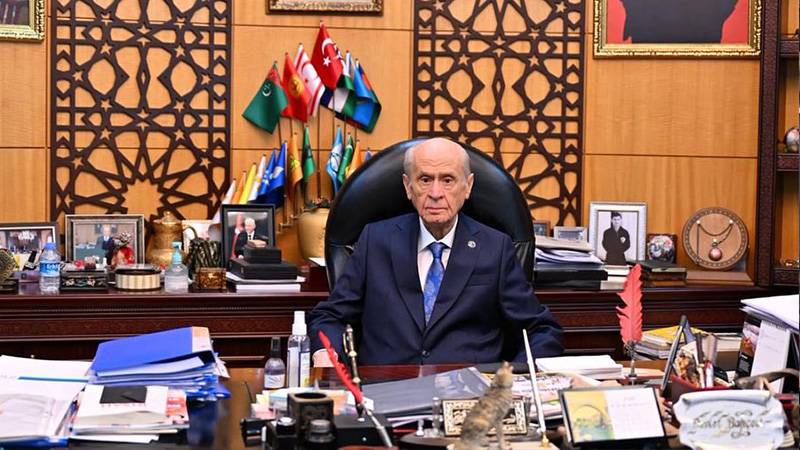The Weekly Turkey Report: 3rd Week of April
Turkey is currently focused on deciphering the social media messages of Devlet Bahçeli, leader of the Nationalist Movement Party (MHP), a coalition partner in the government. Bahçeli’s support for the operation targeting the Istanbul Metropolitan Municipality (İBB), coupled with his call for Ekrem İmamoğlu to be swiftly tried—acquitted if innocent or punished if guilty—has created confusion.
Legal experts closely following the case agree that there is no substantial accusation warranting the detention of Ekrem İmamoğlu, the Mayor of Istanbul and the official presidential candidate of the Republican People’s Party (CHP). Therefore, Bahçeli’s statement could be interpreted as tacit support for İmamoğlu’s release.
However, it remains unclear whether Bahçeli’s message was meant to guide President Erdoğan or simply to appease public opinion. Hopes for peace with the Kurds and the disbanding of the PKK now appear to have faded. Despite calls for peace, Turkey has continued its bombing campaigns across Iraqi Kurdistan, particularly targeting Qandil, according to statements from both the PKK leadership and Bafel Talabani, President of the Patriotic Union of Kurdistan (PUK). In such conditions, the PKK finds it impossible to lay down arms or to convene the congress necessary to declare its formal dissolution.
Mehmet Emin Ekmen, Deputy Chair of the Democracy and Progress Party (DEVA), inquired about the postponed meeting between the Peoples’ Equality and Democracy Party (DEM) and Justice Minister Yılmaz Tunç. The question was directed to DEM Co-Chair Tuncer Bakırhan during a hospital visit to see DEM MP Sırrı Süreyya Önder, who had undergone surgery for a ruptured aorta. Bakırhan stated that the meeting was postponed due to Önder’s health condition.
Devlet Bahçeli has remained silent on this issue. Given Bahçeli’s perceived role as a conduit for “deep state intelligence” rather than an ordinary politician, one could infer that the political establishment in Ankara is not yet ready to abandon Erdoğan. According to a field survey conducted by Metropoll after İmamoğlu’s detention, CHP has gained support, but not by pulling votes from the ruling AKP—instead, it has consolidated support from other opposition parties. Erdoğan, meanwhile, has not lost significant ground and appears to have reclaimed undecided voters under the AKP banner. While CHP remains the leading party, the margin between the two parties has not widened. Erdoğan, therefore, retains a degree of public legitimacy, maintaining support from at least 40% of the electorate.
Similarly, a poll conducted by ORC Research between April 14–17 across 28 provinces with 3,290 participants revealed comparable trends. In response to the question, “If a general election were held this Sunday, which party would you vote for?” CHP led with 30.4%, while the AKP followed with 28%.
Meanwhile, it has emerged that the operation targeting Istanbul’s municipality also has an economic dimension. Following İmamoğlu’s arrest, Erdoğan reportedly gave the green light to the controversial Kanal Istanbul project—long promised to Qatari investors. The Emir of Qatar and his family have already acquired large parcels of land in Sarıyer. Environmentalists warn that the project could trigger a major ecological disaster, yet it remains one of Erdoğan’s most lucrative ventures.
Initially unveiled by Erdoğan in 2011 as his “greatest dream,” the Kanal Istanbul “mega-project” is back in the spotlight with a 24,000-unit TOKİ (public housing) construction underway along its route. A detailed presentation on the project was made to Erdoğan in February. Construction is expected to take five years with an estimated cost of $15 billion (approx. 570 billion Turkish Lira).
In this charged climate, CHP continues its rallies without interruption. During the week, CHP Chair Özgür Özel held nightly rallies in districts where CHP-run municipalities have been targeted by government operations. On Saturday, he held a massive farmers’ rally in Yozgat, a conservative stronghold. Politics and the economy were further shaken by rumors that a trustee (kayyum) might be appointed to the CHP and its upcoming party congress might be canceled. Following provocative posts about these claims, government-aligned commentator Rasim Ozan Kütahyalı was briefly detained and quickly released.
Bahçeli strongly rejected the rumors circulating on social media about a potential trustee appointment to CHP, stating:
“These allegations are immoral and malicious. The CHP has already become a structure that is self-destructing under its own de facto tutelage. The appointment of a trustee is out of the question.”
Meanwhile, Germany’s Handelsblatt reported that the outgoing SPD-Green coalition government has blocked the sale of Eurofighter Typhoon jets to Turkey. Citing sources close to the German government, the report said the decision was a direct response to İmamoğlu’s arrest.
Another judicial scandal erupted this week. Selçuk Kozağaçlı, Honorary Chair of the Progressive Lawyers Association (ÇHD), who had been imprisoned since 2017, was released after serving his sentence in Silivri Prison. However, the prosecutor’s office objected to his release, and Kozağaçlı was rearrested within 24 hours. A court upheld the objection and ordered his return to prison. In a statement, the ÇHD declared:
“Revolutionary lawyers are our pride! We do not recognize these disgraceful rulings. We will bring back all our comrades—we will win!”
On the economic front, the Central Bank was forced to raise interest rates by 350 basis points in an attempt to stabilize the markets following the political shock of İmamoğlu’s arrest. The development prompted many foreign investors to withdraw from Turkey despite anticipated losses. Domestic institutional and individual investors also rushed to convert Turkish Lira into U.S. dollars. To stem the currency’s devaluation, the Central Bank reportedly sold nearly $50 billion in reserves. As a result, bond yields spiked and Turkey’s country risk premium jumped from 250 to 360 basis points.
